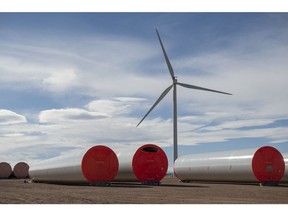
Article content
(Bloomberg) — As Senate Republicans debate President Donald Trump’s tax and spending bill, renewable energy companies are reeling at what looks like a worst-case scenario for the industry.
THIS CONTENT IS RESERVED FOR SUBSCRIBERS ONLY
Subscribe now to read the latest news in your city and across Canada.
- Exclusive articles from Barbara Shecter, Joe O'Connor, Gabriel Friedman, and others.
- Daily content from Financial Times, the world's leading global business publication.
- Unlimited online access to read articles from Financial Post, National Post and 15 news sites across Canada with one account.
- National Post ePaper, an electronic replica of the print edition to view on any device, share and comment on.
- Daily puzzles, including the New York Times Crossword.
SUBSCRIBE TO UNLOCK MORE ARTICLES
Subscribe now to read the latest news in your city and across Canada.
- Exclusive articles from Barbara Shecter, Joe O'Connor, Gabriel Friedman and others.
- Daily content from Financial Times, the world's leading global business publication.
- Unlimited online access to read articles from Financial Post, National Post and 15 news sites across Canada with one account.
- National Post ePaper, an electronic replica of the print edition to view on any device, share and comment on.
- Daily puzzles, including the New York Times Crossword.
REGISTER / SIGN IN TO UNLOCK MORE ARTICLES
Create an account or sign in to continue with your reading experience.
- Access articles from across Canada with one account.
- Share your thoughts and join the conversation in the comments.
- Enjoy additional articles per month.
- Get email updates from your favourite authors.
THIS ARTICLE IS FREE TO READ REGISTER TO UNLOCK.
Create an account or sign in to continue with your reading experience.
- Access articles from across Canada with one account
- Share your thoughts and join the conversation in the comments
- Enjoy additional articles per month
- Get email updates from your favourite authors
Sign In or Create an Account
or
Article content
The latest version of the Senate bill includes a new excise tax on wind and solar projects with certain Chinese components, a late addition that stunned renewable advocates. Given China’s dominance of the solar supply chain, developers would struggle to find ample equipment, including wafers, from other countries.
Article content
Article content
Article content
The bill would also roll back clean energy tax credits sooner than the House version of the package. It would require wind and solar projects to be fully operational by the end of 2027 to qualify for incentives. Many observers had expected the Senate to ease the phaseout — not accelerate it.
Article content
By signing up you consent to receive the above newsletter from Postmedia Network Inc.
Article content
The moves by the Senate, as it seeks to cut spending to offset trillions of dollars in tax cuts, “came out of left field” and shocked the industry, according to Ben King, an associate director with research group Rhodium Group’s Energy & Climate practice.
Article content
If passed in its current form, the “One Big, Beautiful Bill” would threaten billions of dollars of investments, hobbling energy development at a time of skyrocketing power demand. It would also risk causing household energy bills to spike higher.
Article content
“The willingness of the Senate to suggest policy changes that will dramatically increase cost of energy to their consumers and sacrifice significant job growth is very surprising,” said Jason Grumet, chief executive officer of the American Clean Power Association, or ACP, an industry trade group. “It suggests that the effort to repolarize this debate is now taking precedence over their actual constituent interests.”
Article content
Article content
Republican Senators Joni Ernst and Chuck Grassley of Iowa, along with Lisa Murkowski of Alaska, worked Monday to advance an amendment to soften the clean electricity tax credit phaseout and jettison the proposed excise tax. The tax is “unprecedented,” and “the extremity of the proposal may motivate key Senators to support excise tax repeal,” analysts for research provider Capstone LLC wrote in a note Monday.
Article content
ACP estimates the new tax would raise costs on American clean energy companies by $4 billion to $7 billion in the next 10 years, while Rhodium projects it will result in a 10% to 20% increase in the cost of building wind and solar.
Article content
That cost increase would “drive down deployment” and, for some new solar and wind facilities that would otherwise be economically competitive with natural gas, push them “out of the sweet spot,” said King. Because this kind of policy has never been implemented before, the uncertainty it introduces would have a “chilling effect” on investment in renewables, he added.
Article content
The current proposal would also prevent 300 gigawatts of wind and solar — on par with the output of 300 nuclear reactors — from being brought online within the next 15 years, ACP estimates, which Grumet called a “dramatic interruption” of bringing power to the grid as demand soars. Natural gas couldn’t easily fill the gap, due to a shortage of turbines, while nuclear power plants take years to bring online.

.jpg) 8 hours ago
2
8 hours ago
2
 English (US)
English (US)